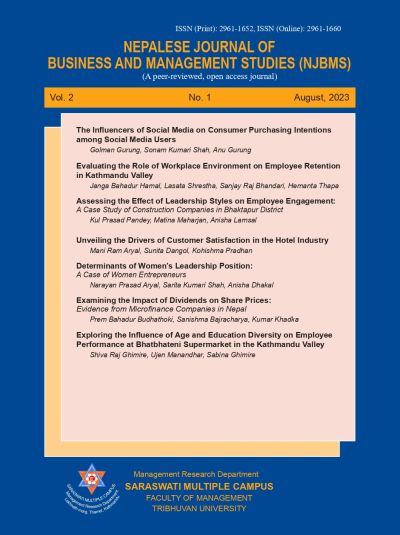Examining the Impact of Dividends on Share Prices: Evidence from Microfinance Companies in Nepal
DOI:
https://doi.org/10.3126/njbms.v2i1.67745Keywords:
shareholder wealth, Dividend, profitability, share priceAbstract
The objective of this empirical study is to investigate how dividends affect stock prices. The antecedent variables are the price-to-earnings ratio, dividend payout ratio, dividend per share, and earnings per share. The consequent variable is the share price of microfinance companies. Profitability (return on equity) acts as a mediator between the antecedent and consequent variables. Microfinance was chosen on the basis of its performance on the Nepal stock exchange, and information was gathered from companies listed in the NEPSE between 2018 and 2022. Purposive or judgmental sampling was utilized to identify the ten microfinance companies that served as study samples. The research employs descriptive statistics, correlation, and regression path analysis models to investigate the mediating role. The findings revealed that the direct and total effects of the dividend payout ratio and earnings per share have insignificant impacts on the share price. Furthermore, the indirect effect of antecedent variables has an insignificant impact on share price through return on equity. Additionally, this study advises investors to use the information not only as a way to profit but also as a tool for assessing companies from an investment standpoint. Moreover, management must determine the dividend payout ratio to enhance shareholder wealth.
Downloads
Downloads
Published
How to Cite
Issue
Section
License

This work is licensed under a Creative Commons Attribution-NonCommercial 4.0 International License.
This license enables reusers to distribute, remix, adapt, and build upon the material in any medium or format for noncommercial purposes only, and only so long as attribution is given to the creator.




